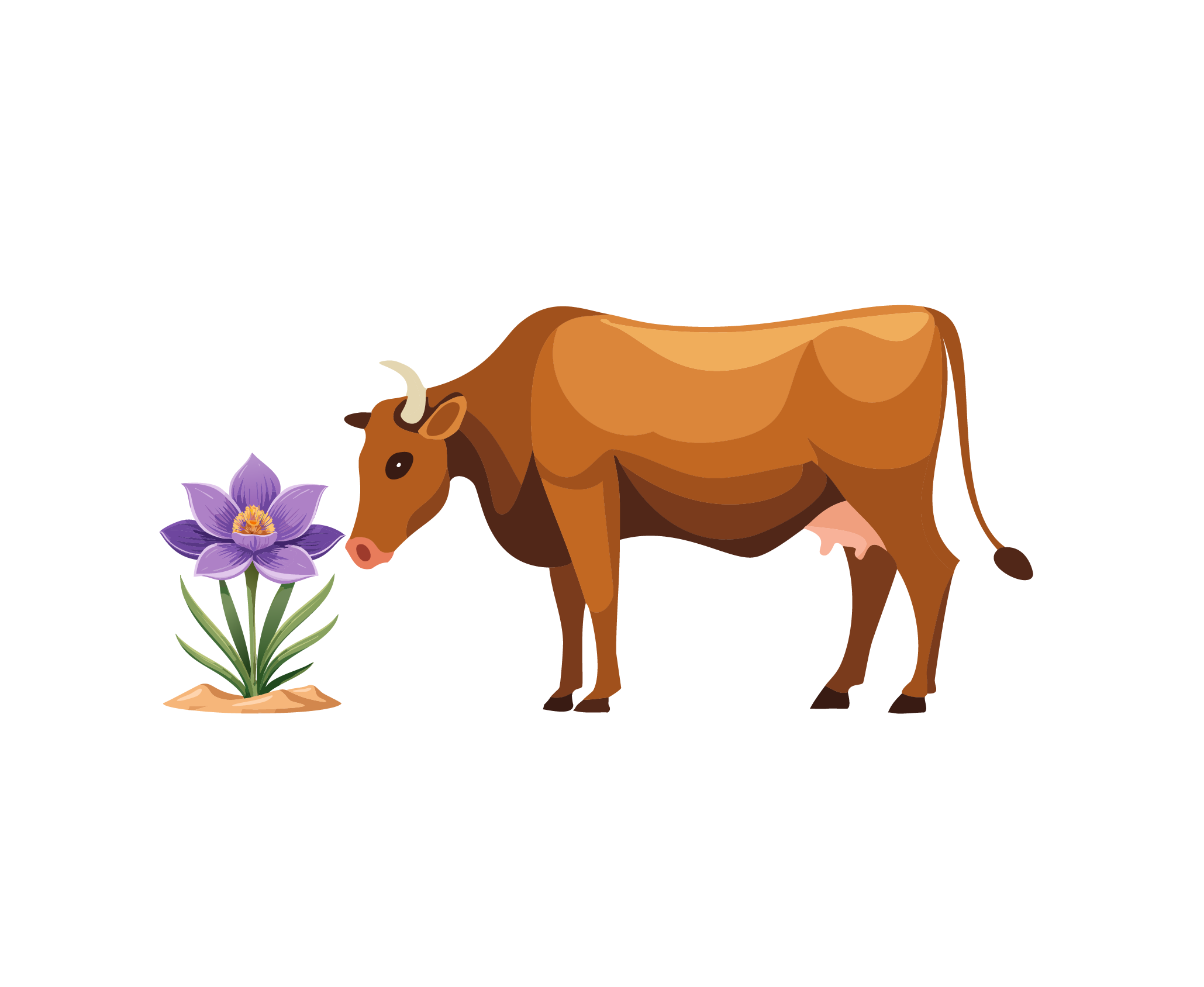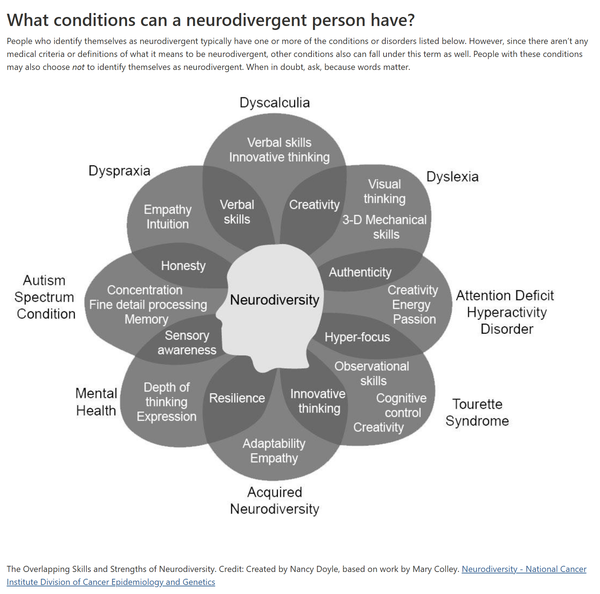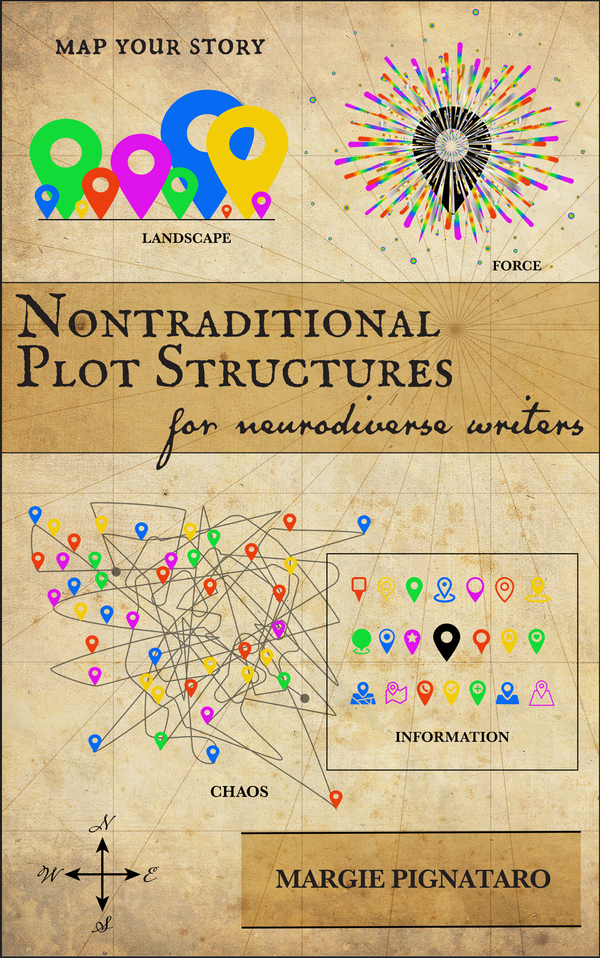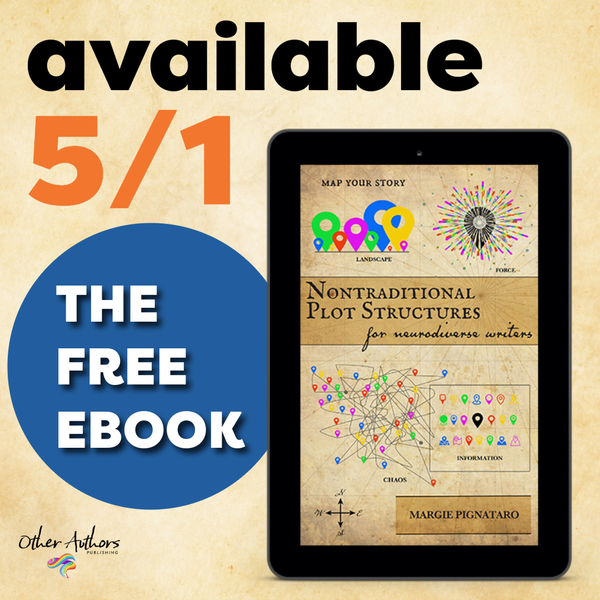"Hey, Diddle, Diddle", a Nursery Rhyme Built With Chaos
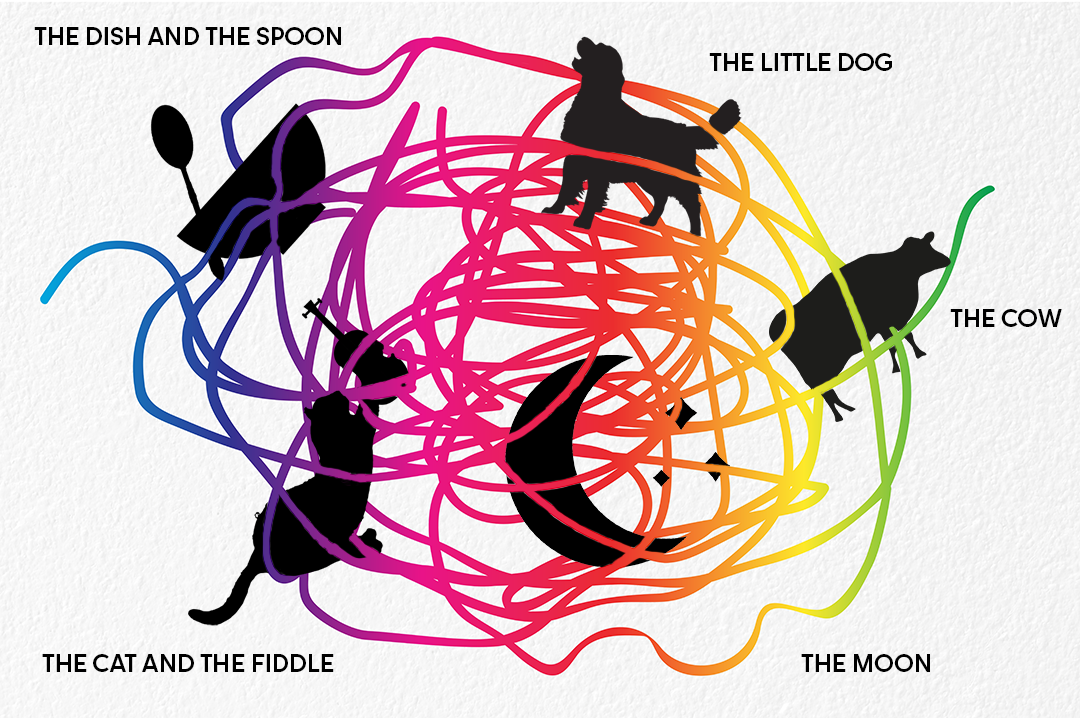
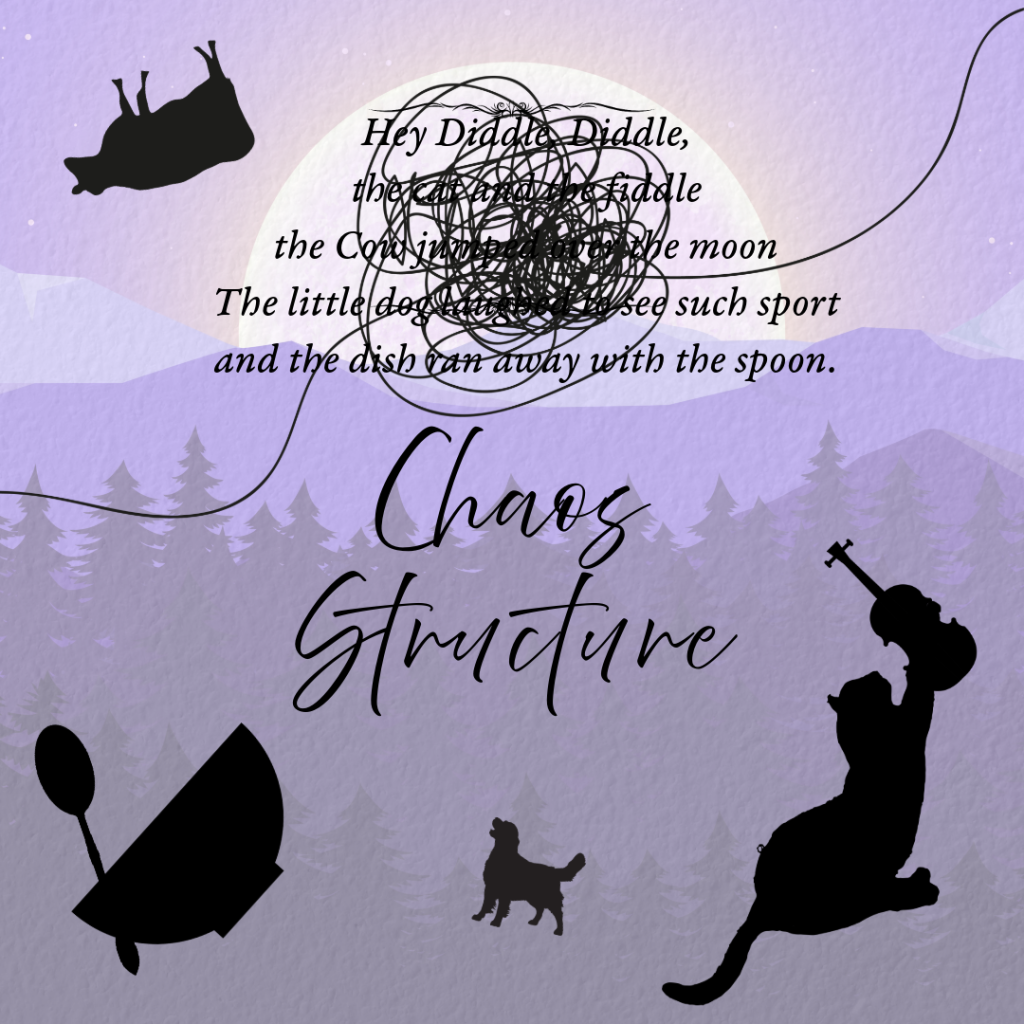
"Hey Diddle, Diddle" (HDD) makes no conventional sense. Theorists and literary critics cannot agree about HDD. Some believe it's "literary nonsense". Others insist it is "gibberish". These are actual literary distinctions. I want to reinterpret and clarify a nursery rhyme that can possibly have links to texts in the 1500s, and had publication in 1765. It's structure seems to have more to do with poetry and song rather than a fictional tale.
Warning: I have autism and I've been doing analysis like this for fun for decades. This may get nuts.
Hey Diddle, Diddle,
the cat and the fiddle,
the Cow jumped over the moon.
The little dog laughed to see such sport
and the dish ran away with the spoon.
Mother Goose, 1765
I will show that if we apply the Chaos structure to HDD, not only will it have a coherent structure, it will gain a coherent intention that is not "nonsense".

I will go along with the effect of nonsense being "an excess of meaning". Watch any music video that's ever been made and chances are you'll find meaning in extreme excess.
Nonsense actually gives HDD some cred. Critics have recognized that it is meant to be nonsense and it achieves this effectively.
Gibberish is random and meaningless, like throwing a deck of playing cards into the air and trying to find meaning where the cards land.
(Although, I could argue that throwing playing cards in the air is meaningful, nonsense, and performance art.)
If HDD is nothing but gibberish, analyzing it isn't important or even possible because there's no underlying meaning. I have to wonder, if something has no underlying meaning, why has this rhyme lasted for so long in culture?
If HDD is "nonsense", we can look it as a tiny story and find its structure and perhaps another meaning than this is clever overload of meaning.
There are loads of theories about what the rhyme is about. Again, no one can agree. I think critics have been beating their heads against the same literary rules for hundreds of years and still wonder why they don't know anything else.
HDD is a very clear and obvious manifestation of Chaos. (Check out my past post for more info about Chaos.)
Chaos is a string. The string can be tangled up and made a mess. It can look impossible to sort out. It doesn't need to be sorted. All that matters is that there's a string. All events in the story are like knots on the string. Meaning can be generated through juxtaposition, arrangement, comparison and contrast, etc.
There are several reasons why I prefer to write in the Chaos structure. Being neurodivergent, it's simply easier to think about a story in this way. The common and conventional journey structure does not feel right; my life and experiences do not feel linear, logical, meaningful, with beginnings, middles and endings.
Chaos is not linear and doesn't attempt to be coherent. It leaps around, seemingly illogically, yet there is meaning behind everything. This reflects a specific experience with the world: one that has more questions and confusion than answers and explanations. Life is about the meaning you make and how you arrange it. There are unknowns, nonsense moments, and dead ends. Chaos is more akin to traumatic flashbacks than a journey, because time loops and repeats. There are leaps between subjects and if you lose your way, it doesn't matter: just go with it.
This, in essence, is HDD.
HDD has the Chaos string. It's undeniable and everyone who has said anything about this rhyme has found it. HDD is about fun. It's about pleasure.
The Knots
- Hey Diddle, Diddle
- The Cat and the Fiddle
- Cow and the Moon
- The laughing little Dog
- The Dish and the Spoon
These are all common objects and animals. There is nothing fantastical in the elements themselves. This will become important when we interpret HDD in a bigger picture.
Every action or event in the rhyme is physically impossible. Some of the actions aren't proper actions at all. The dog laughing is an action without end. The Cat is presumably playing the Fiddle, but it's left ambiguous. If it is, playing is another action without end. The Cow jumping over the moon is a complete action, having a clear point of completion.
The Dish running away with the Spoon is a non-action (this doesn't mean the action doesn't count; it simply means it's a weaker choice). The agent of (non) action, or the character whose actions are pushing events forward, in this line, is the Dish.
The Dish is taking the Spoon with it (which could be interpreted as a misogynistic role, the Spoon being passive and under the authority of the Spoon; but I think if the Spoon and the Dish were to follow normal gender roles, the Spoon would be a fork; but then it wouldn't rhyme with "moon").
"Running away" is an incomplete and a negative action. There is no focus, no goal. The action is based on a negation, not an achievement. The person is absenting, not achieving. How will the Dish know it has "run away"? It would be better to give the Dish concrete goal, as in the case of Romeo and Juliet: the Dish and the Spoon ran away to Mantua.
"Diddle" vs. "Fiddle"

the etymology for diddle is ""to totter" (1630s); "move rapidly up and down or backward and forward" (1786)". This is a strange inclusion in the rhyme. Because "diddle" rhymes with "fiddle" it seems a logical, musical inclusion. "Diddle" and "fiddle" are just fun to say as well. But there's another layer.
"Diddle" has two definitions (at the writing of HDD) that make it impossible for the word to be placed in this context for its literal meaning. It makes sense though if you look at it as a device for "setting the stage" or creating the universe. The rhyme begins immediately with a pairing that makes no sense. This informs the audience that the world in this rhyme will, seemingly, make no conventional sense.
All that makes sense about the pairing is the rhyme. Therefore, words are used not for their literal use, nor in their proper way, but to change our expectations and create a world that is, for lack of a better word, magical. If "diddle" and "fiddle" didn't rhyme, HDD would be gibberish and meaningless.
The Cat and the Fiddle
I would like to consider "the cat and the fiddle" to be an event.
There is no clear action. We don't know what the cat is doing with the fiddle. But the juxtaposition is both adorable and absurd. A cat combined with anything "human" is always adorable; there are billions of cat memes that attest to this.
There's also a reason why the cat is with a fiddle. We must look at the history of the word "catgut".

And a few more details from Wikipedia:
"Alternatively, it may derive by folk etymology from kitgut or kitstring — the dialectal word kit, meaning fiddle, having at some point been confused with the word kit for a young cat…"
The original words that formed our modern "catgut" were mixed up in meaning and pronunciation. A cat with a fiddle plays on this very old word play. A cat and a fiddle are one and the same. Perhaps the cat isn't doing anything with the fiddle because the cat IS the fiddle, and the fiddle is the cat.
The Cow and the Moon
"Over the moon" is a common British expression to describe joy. When I went into the history of the idiom, Google's AI offered me this explanation:
The phrase "over the moon" originated in the 16th century nursery rhyme Hey Diddle Diddle, which includes the line "the cow jumps over the moon". The rhyme was originally written as "High Diddle Diddle" and was intended to be nonsense, so it's unclear why the cow is associated with joy.
Google's AI Overview
There's agreement that the origin of "over the moon" came from HDD, but it is unclear when the association of being over the moon equated with joy. It's possible that in the 16th century this was a common idiom and Mother Goose was the first to put it into print. Let's assume for the sake of argument that it actually is associated with joy.
The cow is jumping over the moon in joy. In this universe, a cow is not only capable of the impressive physical feat of launching itself into the moon's orbit, but doing so joyfully.
Why a cow? I found a possible unattractive interpretation, but possibly inaccurate.
According to the Etymology:
Applied to the females of various large animals from late 14c. As an insulting or degrading word for a woman, 1690s.
Online Etymology Dictionary
We're in that position again. HDD was written in the late 1500s and by the late 1600s calling a woman a cow was common. Did it exist prior to it being found in a text or does it go further back. Considering that calling a woman a cow isn't something that would have been included in most texts of the times (most of which were highly academic or religious), it's possible it slipped under the radar for a hundred years.
For fun, let's go with this interpretation, aware that it may be problematic. (It will help later when I break HDD down into an contemporary, adult, chaos interpretation, just for fun.)
Once again, we have a possible word play. Cow and woman and the blurring between the two mirrors our cat/fiddle.
The Laughing Dog
Let's just jump into the etymology of "dog".
In reference to persons, by c. 1200 in abuse or contempt as "a mean, worthless fellow, currish, sneaking scoundrel." Playfully abusive sense of "rakish man," especially if young, "a sport, a gallant" is from 1610s.
Here we have the possible male version of our jumping cow. It was at this point that I started to become reminded of a pub, late at night, everyone drunk and carrying on. I'm not saying this is exactly the description of a pub, but it's an interpretation that can lay somewhat comfortably on this rhyme and give us a human feeling.
As far as "laugh" goes...

The word isn't a perfect onomatopoeia, but there's enough of a likeness between the pronunciation of "laugh" (lach) and what laughing or cackling can sound like….or a dog barking.
As early as the 16th century, "sport" came to mean a diversion, a game with physical exercise, pleasure or comfort. Its slang version also referred to as sexual intercourse. I'll hold off with discussion of the possible sexual interpretation of HDD until the end. In this context, the sexual definition isn't as strong of a choice as meaning a physical game.
The Dish and the Spoon
As far as I can tell, a "dish" has been a dish as long as there have been dishes. There's no word play possible.
But a "spoon" begins to complicate things. This may be stretching things, considering the dates below, but it, again, comes down to when a word is recorded versus when it began to become popular in conversations.
The meaning "court, flirt sentimentally" is recorded by 1831, a back-formation from spoony (adj.) "soft, silly, weak-minded, foolishly sentimental." The meaning "lie close to," as two stacked spoons (with the face of one to the back of the other) is by 1870 (in a reminiscence of survival in Andersonville in the American Civil War); to lie spoon-fashion is attested by 1814.
Online Etymology Dictionary
Because the Dish ran away with the Spoon, the spoon is in the passive, perhaps feminine role. A spoon, by it's shape and curves, can be interpreted as a woman. The loose meaning of "soft, silly, weak-minded, foolishly sentimental" becomes dangerously close to many, many descriptions I've read from this time period and later. Stretching this again, spooning was something commonly referred to as it is today.
The point I'm making is that the Spoon and the Dish have a layer of physicality and romance to them. Having this be the last line in the rhyme, it reads like the end of a comedy. In many ways, this has been a comedy of Chaos.
The Chaos
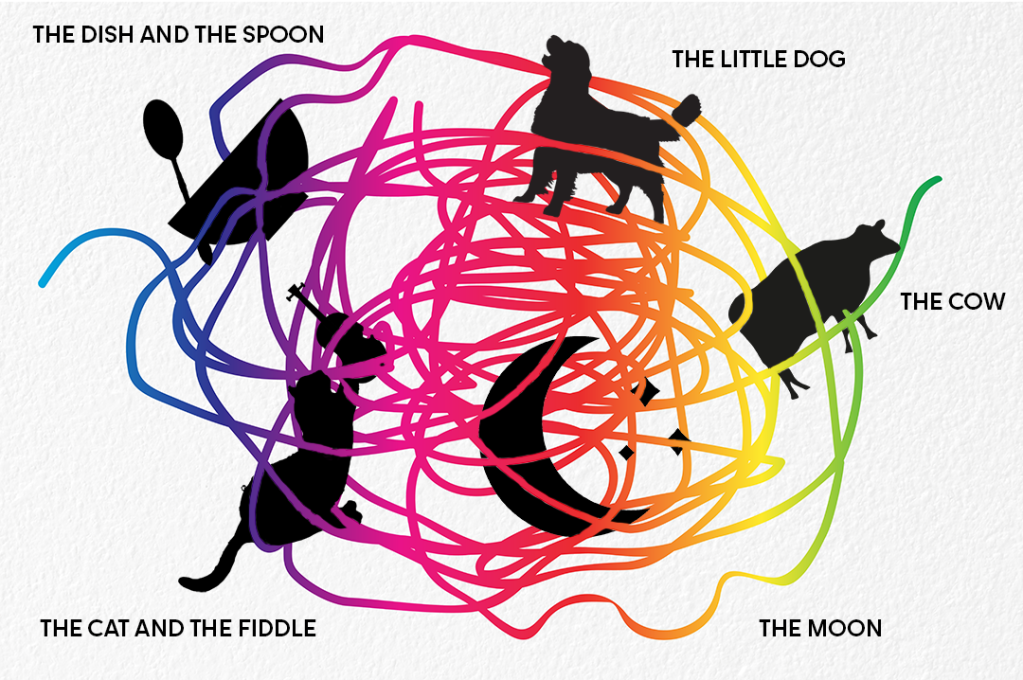
How do we look at this through the lens of Chaos?
Let's return to our knots:
- Hey Diddle, Diddle
- The Cat and the Fiddle
- The Cow and the Moon
- The laughing little Dog
- The Dish and the Spoon
In a Chaos structure, the order of events does have importance. Unlike a journey structure, there isn't one important, required order.
The order of these knots seems to have only a musical requirement: rhyme and beats. But the Cat and the Fiddle doesn't have to "happen" before the Cow jumps over the Moon. Nor are the Dish and Spoon able to run away because the little Dog laughed.
Think of this as being in a pub. Someone calls out something to someone across the room. Then, there's music, someone's playing a guitar or there's a band. Then some woman gets really drunk and dances on top of the bar. Then a man laughs at her as she does so. Then, a couple in the back of the room, finally have had enough and take off so they can have "alone time".
I'm not saying this is what's happening in the rhyme. I'm saying that the rhyme, using Chaos, is showing us the thread that occurs in every day life. The objects and animals are every day, common occurrences, yet magical things happen. When you're drunk and in a pub (believe me) a lot of weird magic can happen.
The Chaos structure is presenting a world that is both recognizable and fantastical. Weird and wondrous things happen without explanation or reason and seem to defy the universe (have you ever won at a slot machine?). The things that happen are fun and thrilling. Life, in essence, is fun and miraculous.
If you pay attention, if you "see such sport", you will laugh and not freak out.
Because the Chaos structure depends upon some kind of confusion or literary nonsense, every line in HDD becomes a surprise. We cannot anticipate what will happen next. This is the universe HDD creates. Life is constantly a surprise and even with the most mundane items there is potential for astonishment.
Yes, HDD is fun. Yes, it's about pleasure. But it's also about telling people who live in a sometimes horrifying and filthy world that life is playful. Life is enjoyable. It doesn't require money or class standing to attain. You will find pleasure in a dish and a spoon.
An Anachronistic, Adult Chaos Interpretation of "Hey Diddle, Diddle"
My first few read-throughs of HDD (I must've read it dozens of times), I was struck by the number of sexual references that certain words in the rhyme have gained over time.
In general criticism, it's never a good idea to interpret a text outside of the time it was written. Perhaps looking for past literary allusions is the only acceptable form, but never go forward in time.
I learned this working on Shakespeare plays and writing papers on Shakespeare.
BUT the sexual references are unavoidable to a contemporary audience and it is a Chaos thread that has been created in the past 300 years.
Diddle: sexual activity of almost any nature. There are two "diddles" and I can't help hear the Doublemint Gum commercial "double your pleasure".
Cat: cats have gained a sexual reputation of being rather promiscuous. "Catting for a fuck" is my favorite usage of the word aligned with sex.
Fiddle: Sex-Lexis.com say this is one of a billion euphemisms for a vagina. This creates a wildly interesting reading for "The cat and the fiddle".
Cow: As referenced above, is a woman, large-breasted, or an older prostitute.
Moon: dating back to the 18th century, this referred to an ass or anus. (I'm not even going to hazard a guess what sexual act or position "jumping over the moon" is.
Dog: A penis, sexual intercourse, or a salacious man.
Laugh: As strange as it may sound, laughing during or after an orgasm is a thing. The dog laughing watching the cow jump over the moon could be read as voyeurism.
Sport: As early as the 16th century, it referred to sexual intercourse.
Dish: A sexy, attractive man or woman.
Spoon: This is a general term for any physical activity in a couple, or the actual position of laying in bed front to back.
Running Away: eloping.
This is a staggering number of contemporary sexual references. Don't think this kind of reading is applicable to other Mother Goose rhymes. "Little Miss Muffet", "Humpty Dumpty", "Jack and Jill" and others have no possible sexual reading.
Though I will grant that "Two Little Dickie Birds" can be read as involving a gay couple.
I think this reading affords us a Chaos interpretation of sex. Rather than seeing this as a thread that runs into a convoluted ball, it's more like ivy that has, through the centuries, grown upon the rhyme.
The universe is extremely sexual, all hidden under the covers of respectable, common animals and objects. Life itself is charged with sexual desire. The presence of animals encourages a wild interpretation. The presence of inanimate objects calls attention to the use of objects and toys in sex. Coupling seems random, yet there are fulfilling sexual acts. Even the dog, watching alone, has great pleasure.
Both interpretations I've constructed come back to the same basic concept: pleasure. I think that the reason why so many words in the rhyme have grown sexual meanings is because the words all referenced things that were pleasurable to begin with. Sexuality is so built into the structure of our existence that we are always amused by gaining new sexual slang.
To sum up: "Hey Diddle, Diddle" could be made into one hell of a porno.
Of course, this is my interpretation. I think I'm beginning to surface from my deep dive.
If you have any questions or comments, please post them or send them to me.
Thank you for your attention.
